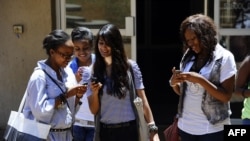When it comes to fighting viral outbreaks - or even stopping water shortages - healthcare applications which integrate real-time analytics, data centers and messaging platforms are poised to improve the critical initial response to epidemics and natural disasters.
mHero, new app
The first line of defense against deadly viral outbreaks, water shortages and food scarcity might just end up on your phone. A new application called mHero, created in Uganda, combines health worker registries, patient data, real-time monitoring and open messaging systems to ensure a fast and integrated response. mHero stands for Mobile Health Worker Electronic Response and Outreach.
It uses a revolutionary messaging platform called RapidPro that employs ‘trigger’ words to contact specialized workers if a disease like Ebola is discovered. It also allows users to track whom they’ve reached and create real-time analytics based on their responses.
Recent example, quick use
A few weeks ago, Uganda experienced an outbreak of Marburg, a viral hemorrhagic fever similar to Ebola. Sean Blaschke, a health systems specialist at UNICEF explains how Uganda has excelled in providing quick containment.
“You can see with the case of Marburg here a couple weeks ago how quickly the country mobilized, and suspected cases were followed up in hours and it didn’t move beyond a single index patient. And I think Uganda really does show and provide a model for the rest of the world on how you can build a national sustainable health systems architecture…We are very excited because these tools that are now being scaled up in West Africa, originated in Uganda, were built by Ugandans… this these solutions came from Africa and are being used in Africa,” Blaschke said.
The Ugandan Ministry of Health says that in the next three months, mHero systems will be deployed around Uganda.
Crisis management, using mobile device
mHero has wide application since it can broach language and literacy divides by using picture-based references. Nimrod Wandera, a software developer, explains how those with zero experience using smart phones and applications were trained in mHero.
“So we thought about the app as a box, so we made a box out of hard paper, and that box was covered and on top of it was the name of the app. So you have a box and then you tell someone, when I give you the phone I’m giving you a box, and that box has things in it…what we call features were small boxes inside that box…and there they find mother reminders, they find household surveys…when we give them back the phone life was much simpler, they could click through, they could understand that now I can go out of this box, and into the bigger box…this is real stuff. ”
To access these databases, registered healthcare workers, NGOs and clinics must fill out an application from the Ministry of Health, and approval comes shortly after. There are also stopgaps in place to ensure patient medical records are kept confidential. Officials are hoping that mHero, and apps like it, bring a new level of crisis management throughout the African continent.
